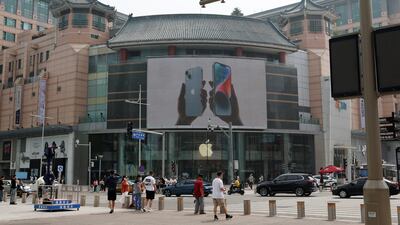Apple shares fell almost 3 per cent on Thursday, wiping out about $190 billion of market value in just two days, as China plans to expand a ban on the use of iPhones to government-backed agencies and state companies.
Shares of the Cupertino, California-based company dropped 6.4 per cent in the worst two-day slump in a month.
Apple is the biggest component in major US equity indexes, adding to a broader sell-off sparked in part by a litany of woes in China.
The world’s second-biggest economy has been slumping amid a protracted crisis in its real estate market, threatening demand for everything from commodities to consumer electronics.
It was reported on Wednesday that central government agency officials were told not bring iPhones into the office or use them for work.
The next day it was reported that Beijing plans to expand the ban on the use of iPhones in sensitive departments of government-backed agencies and state companies, a sign of growing challenges for Apple in its biggest foreign market and global production base.
In addition, Beijing intends to extend that restriction far more broadly to a plethora of state-owned enterprises and other government-controlled organisations, people familiar with the matter said.
Adding to Apple’s troubles are rising US Treasury yields as bonds sell off on worries the US Federal Reserve will have to step up its fight against inflation as the US economy remains resilient.
The news is having a widespread effect on the markets, with investors selling everything from chips, mega-cap technology to US-listed Chinese stocks.
“The Nasdaq is sinking as one bad Apple spoils a bunch of mega-cap tech stocks,” said Edward Moya, senior market analyst at Oanda.
“Apple’s growth story is heavily reliant on China and if the Beijing crackdown intensifies that could pose a big problem to the bunch of other mega-cap tech companies that rely on China.”
Bank of America analyst Wamsi Mohan noted that the “timing of the potential ban is interesting”, given the recent launch of Huawei Technologies' high-end 5G-capable smartphone.
The teardown of the new device shows that Beijing seems to be making early progress in a nationwide push to circumvent US efforts to contain its ascent, with Huawei’s Mate 60 Pro being powered by Semiconductor Manufacturing International's 7nm chips, according to analysis TechInsights conducted for Bloomberg News.

If Beijing goes ahead with a ban, the unprecedented blockade might also affect several other US technology companies that rely on sales and production in China.
Apple suppliers across continents were trading lower on Thursday as multiple reports confirmed China’s latest changes.
However, bullish analysts like Wedbush Securities’ Daniel Ives think the effect of an “iPhone ban is way overblown” as it would affect less than 500,000 iPhones of the roughly 45 million he expects to be sold in the country over the next 12 months.
“Despite the loud noise Apple has seen massive share gains in China smartphone market,” Mr Ives, who has an overweight rating on the stock, wrote in a note.
Apple is unlikely to face a material financial impact from China’s restrictions, according to Evercore ISI’s Amit Daryanani.
Government officials were probably already avoiding the company’s products, and it would be hard for the nation to take more substantive action against Apple without affecting jobs in the country, which is where most iPhones are assembled, he wrote.

